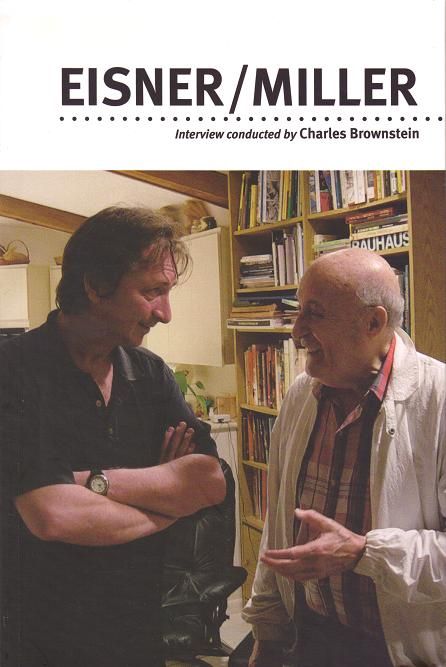Okay, so Eisner/Miller came out in 2005, but I just got around to reading it, so I'm going to review it! Nyah-nyah-nyah!
I've written this before and I'll write it again, but I LOVE behind-the-scenes stuff. I love books about the making of things, be they comics or movies (I love All About "All About Eve" and Future Noir: The Making of Blade Runner, for instance) or music (those 33 1/3 books are pretty keen). I love commentary on DVDs and become grumpy when they suck. So I was terribly keen to read this, in which Frank Miller and Will Eisner have a conversation. Yep, that's it.
Of course, when you have Frank Miller and Will Eisner chatting with each other, it's bound to get interesting, and this book is pretty interesting. The two men go on about almost everything you can think of with regard to comics, from the format to the way to create books to the history of the medium to where things are going. There's so much in this book that it's hard to really give too many examples, but if you're going to delve into comics, it's hard to find two people more qualified. These guys, you might say, know their stuff.
What makes the book fascinating is the two personalities on display here. The conversation took place in 2002, so Eisner was 85 and Miller was 45. Eisner is far from the grumpy old man, however - that role seems to go to Miller. Eisner is much more mellow about comics and the people in the industry, possibly because he was able to outlive many of the pioneers of the medium and can reflect more on his life. Miller has always seemed to be a firebrand, and it's certainly on display here. Eisner also lived through some of the things they talk about - the Kefauver hearings, for instance - and so he's able to bring a better perspective to those events. Miller, with the passion of a "youngster," has a difficult time with the fact that some of the older creators didn't strike out on their own - he tends to scoff at Eisner's contention that people needed to make a living. Miller, of course, was one of the people who changed the way business was done in the late 1970s/early 1980s, and they talk about that a lot. Eisner returned to comics about that time, with A Contract with God, but he was coming at it from a different route - he had never done true work-for-hire and didn't need to, so Miller's personal history about this period is pretty interesting.
The two men talk shop for a while, and even though I was a bit lost in this section because I'm not an artist, it was fascinating. They discuss how they create the art and what kind of materials they use, what schedule they tend to keep, and their favorite parts of the process. What's interesting is that they both agree that inking is the best part of the job - they both do very sketchy pencil work and then really "create" the panel in the inking process. Wait a minute - I thought inkers were just tracers? Damn you, Kevin Smith! I haven't read too much about the process of pencilling to inking, but this is a really good discussion about how the two men create a page, from the process to the way Miller tends to suggest things more than Eisner, who actually draws windows in buildings. But despite their differences in style, it's a great chat about the way comics are made. It's rather interesting that Eisner has more respect for the "assembly line" process of comics, with a different writer, penciller, and inker, while Miller seems to be a bit suspicious of it (obviously, he still works within that system, but he doesn't seem to like it very much). I say that's interesting because I've always believed that Miller is a much better artist than writer, and some of his comics (not all, but some) would benefit from someone else writing them. But that's just me. Miller hasn't drawn anything that he didn't write since the early Daredevil issues, but occasionally, his writing is completely overwrought, and not in a good way.
They move on to more general comics, and the conversation continues to be interesting. Eisner has a lot of interesting stories from the bad old days, and he even explains that Bob Kane might not deserve the opprobrium that so many comics fans today have for him. They also talk about the future of comics, not to a great extent, but to a degree. The book is packed with anecdotes about creators, both old and new, and interesting insight into the way things get done in the business, how to be a professional, and how to manage your career. Obviously, this advice isn't germane to everyone, but it's kind of keen reading how these two guys did it and how they both managed to forge fairly different paths. And, for those people who think Lynn Varley doesn't exist or isn't a colorist, Miller speaks rather casually about her in a way that, if she doesn't exist, means he's a brilliant and possibly sociopathic liar or he has a pretty severe multiple personality disorder. I mean, why would he talk about her in a casual conversation without Eisner bringing her up if she didn't exist? It makes no sense.
Anyway, Eisner/Miller is a very interesting book about the guts of comics. Because the two men are just chatting, it comes off as much more informative about some parts of the business than if it had been "official" interviews, because they just let the conversation go where it goes without forcing it anywhere. If you're at all interested in comics in more ways than just being entertained by them, it's a very cool book to check out.


